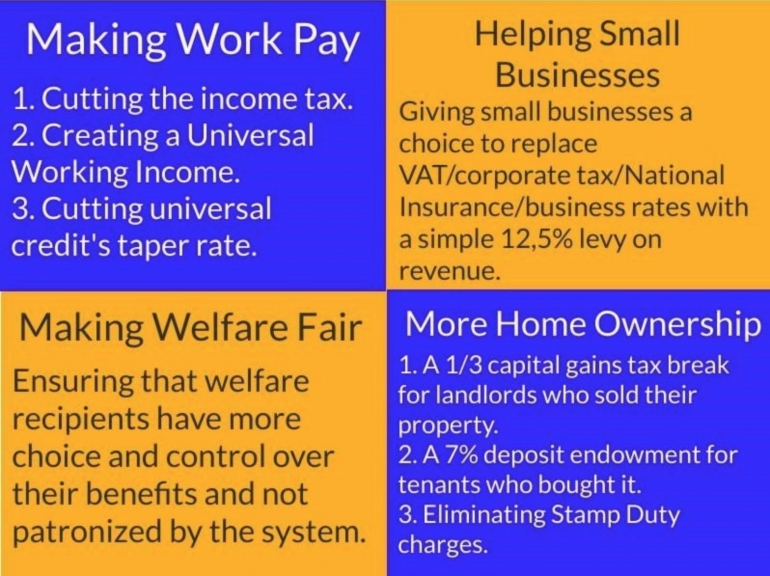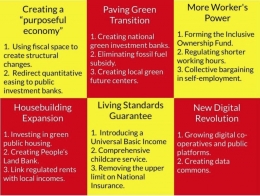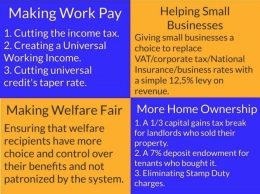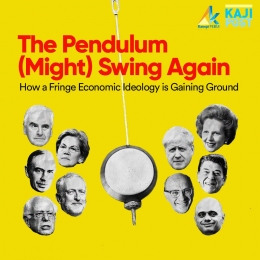Thursday, December 12, 2019, is a historical day. Britain went into the polls in winter, the first time since 1911. At first, the torn minority Tory government don't want an election.
"I don't want an election, you don't want an election," Prime Minister Boris Johnson said. In the end, it becomes the Tories' ultimate lucky strike. They got a majority of 78, their largest mandate since 1987.
This majority spells two things. First, the Conservative government got a powerful majority to get Brexit done. Second, it spells an end for Corbynism. Put together by Jeremy Corbyn, it is an ambitious, left-wing political agenda that would radically change the economic model of Britain. Other than that, it is a part of a worldwide political agenda that might swing the pendulum.
How Political Ideology Shapes our Economy
Economics is a multifaceted thing. Its aspects coincide with one another, forming complex relationships among economic actors. These relationships blossomed along the ages, but as the 20th century begins, there's a new kid on the block. It's called the interventionist government. David Lloyd George's 1909 "People's Budget" embodies this new type of government. It exercises its ability to influence society through economic policies so they can repair society's problems.
Thus, where is the source of these economic policy ideas? What is the source of political power's goals? There are many answers to these questions. One of them is a political ideology, which describes positions and strategies in the political field (Martin, 2015:9).
Political position shapes the general course of economic policy. Then, strategies form the practical ways to deliver those policies. Without political ideology, economic policy would lose its change-making abilities and legitimacy. Of course, no political power wants that.
To summarize, political power needs a political ideology. This ideology would shape the arsenal of economic policies, which would then create the desired changes in the economy.
Established political powers desire to preserve the prevailing economic structure. In contrast, revolutionary political powers desire to change the existing economic agenda.
How Ideological Hijacking Disrupts the Economy
To see these desires, let's hark back towards history. Remember The Great Depression in the 30s? This economic catastrophe ushered in The Keynesian Revolution.
It is a revolution that called for government activism in economics. Social Democrats around the globe found legitimacy in that activism. After that, policies like nationalization, the welfare state, and others become the norm.
But, the 70s malaise brought an end to this revolution. Thus, it became a hotbed for fringe movements to plan radical ideas. One of them is Milton Friedman's Monetarism.
This ideology puts an emphasis towards money supply control, free markets, and smaller government. Then, it found sympathy from conservatives like Margaret Thatcher and Ronald Reagan. They embedded Monetarism into their political agendas and campaigns.
Their campaigns proved to be successful, as they both drove out the Keynesian policy tenets. It is replaced with privatization, deregulation, balanced budgets, and other measures. The Reagan-Thatcher Revolution became its anointed name.
So, it is crystal clear that a combination of outlier political ideology and unique economic theory drove these revolutions. Social Democrats made Keynesian Economics their weapon. Reagano-Thatcherites found their arsenal in Monetarism. Without these partnerships, both would fail to swing the political pendulum.
The New Economics Movement (NEM) as a Potential Hijacker
Since Thatcher's resignation in 1990, political powers gathered around the center. Tony Blair's New Labour and Bill Clinton's New Democrats are clear examples of this centrist tendency.
They focused around building on the Neoliberal legacy while improving social conditions. But, The Great Recession of 2008 becomes the whip that revived this relationship.
When decline looms, fringe ideology blooms. One of them is the New Economics Movement (NEM). This transatlantic movement promotes an ambitious ideology, one that "fashions the economy to serve us and the natural world," (New Economics Foundation [NEF], 2018:4). Nowadays, think tanks such as the New Economics Foundation (NEF), Institute for Public Policy Research (IPPR), and others drive this movement.
Their mission is ambitious. NEM wants to create a fairer, more inclusive, less exploitative, and less destructive economy towards society and our planet. They even said that they would address the gross inequality of Neoliberalism. Read this statement from NEF's report "An Economy for The People, by The People" (NEF, 2018:2-3).
"The four-decade-old neoliberal model is exhausted; what is needed now is a new economics in which government rediscovers its role in pursuit of an economy that works for people and planet."
To hijack the economy, NEM needed a radical rediscovering political power in government. Britain's NEM found fertile ground in Jeremy Corbyn's Labour Party while America's NEM gains ground in the Progressives of the Democratic Party. If elected, both will want to swing the pendulum back to the left.
"Fundamental Rework of Capitalism": Changes it Would Carve
For swinging the pendulum, they are following one clear aim: redistribute economic power within society. Everyone will get equal shares of the pie. Thus, it requires a fundamental rework of capitalism, where they need an interventionist government. Next, their intervention should create these changes (New Economics Foundation [NEF], 2018:6-9).

Even more than that, NEM's stimulus is different from the IMF's temporary stimulus (2018:2). In their own words, NEF said that they need them to create this (NEF, 2018:6):
"New fiscal rules that shift the focus from managing public debt to using up fiscal space to steer and drive structural change in the economy."
It means that NEM wants a permanent stimulus to "steer structural change". But, the IMF advocate for a temporary stimulus by infrastructure spending and structural reforms (IMF, 2018:2). In other words, NEM wants permanent use of that space to advance their political goals. They want to wage a permanent fiscal revolution. Managing public debt? Scrap it!
Then, government-led green initiatives would create a myriad of bureaucratic environmental bodies. This bureaucracy makes those initiatives less responsive to environmental demands.
Eastern Bloc nations' experience with bureaucracy's effect on the environment might teach them something. But, the most horrendous effect would come from NEM's policies for more workers' power.
Their "Inclusive Ownership Fund" draws striking resemblance with Sweden's "Wage-Earner Funds". Introduced in 1984, it "basically buy the companies with the companies' own money," said Carola Lemne, one of Sweden's leading industrialist. Instead of increasing worker's power, it scared many entrepreneurs. They withheld their investments and halt expansion. Even companies like IKEA moved out. Finally, the Swedish government dissolves this scheme in 1991 (Meidner, 1993:225).
In essence, NEM is an attempt to revive past failures under sophisticated packaging, which gains ground with the masses. If it remains this way, the Neoliberal establishment would lose. Thus, the present order needs to respond with renewed vigor and innovation. But, how to renew both? Governments must implement Popular Capitalism.
This term is a set of free-market reforms that create a meritocratic society (Colville, 2019:2). It was an ideology, "nothing less than a crusade to enfranchise the many in the economic life of the nation." Thus, Popular Capitalism involves several market-based policies (Colville, 2019:36-41).

Both have the same goal. These examples show their difference in delivering them. NEM would guarantee economic powers to local bodies and schemes. They become third-party representations of individuals. In contrast, Popular Capitalism gives economic powers back to each individual. In NEM, trade unions/local bodies would choose for their members. But Popular Capitalism lets each individual make their own choice.
"NEM see you as a part of aggregations. Popular Capitalism sees you as a sovereign being."
This is a powerful message in itself. Governments need to have the courage to reconvey that message. Without that courage, the whole world would fall into the labyrinth of socialism.
Oleh: Rionanda Dhamma Putra | Ilmu Ekonomi 2019 | Trainee Kajian 2019
REFERENCES
- Colvile, Robert. (2019, September 27). Popular Capitalism. Retrieved from https://www.cps.org.uk.
- International Monetary Fund. (2018, June 15). Assessing Fiscal Space: An Update and Stocktaking. Retrieved from https://www.imf.org.
- Martin, John Levi. (2015). What is Ideology?. Retrieved from http://home.uchicago.edu.
- New Economics Foundation. (2018). AN ECONOMY FOR THE PEOPLE, BY THE PEOPLE. Retrieved from https://neweconomics.org.
Follow Instagram @kompasianacom juga Tiktok @kompasiana biar nggak ketinggalan event seru komunitas dan tips dapat cuan dari Kompasiana
Baca juga cerita inspiratif langsung dari smartphone kamu dengan bergabung di WhatsApp Channel Kompasiana di SINI









